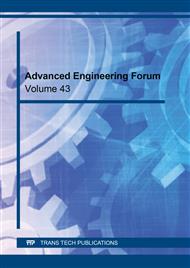[1]
Sambo Abubakar, Garba Babayo, & Zarma Ismaila, & Gaji Muhammed. Electricity generation and present challenges in the Nigerian power sector. J. Energy Power Eng. 6 (2010) 61-69.
Google Scholar
[2]
Cole, A.O. Restructuring the electric power utility industry in nigeria. Proceeding 20th National Conference of the Nigerian Society of Engineers (Electrical Division), October 6-7: 1-6.
Google Scholar
[3]
Igbokoyi A.O, Abuja Nigeria, Omowumi Iledare. The role of natural gas in nigeria power generation: emprical analysis of challenges, constraints and opportunities. SPE Nigeria Annual International Conference. Lagos, Nigeria. August 4 – 6 (2015) https://doi.org/10.2118/178394-MS.
DOI: 10.2118/178394-ms
Google Scholar
[4]
Adegoriola A.E., Agbanuji D.A. Impact of electricity consumption on economic growth in Nigeria, Int. J. Humanit. Soc. Sci. 8 (2020) 45-60. doi.org/10.24940/theijhss/2020/v8/i5/hs2005-034.
DOI: 10.24940/theijhss/2020/v8/i5/hs2005-034
Google Scholar
[5]
Ibitoye, F. and Adenikinju, A. Future demand for electricity in Nigeria. Appl. Energy, 84 (2007) 492-504. https://doi.org/10.1016/j.apenergy.2006.09.011.
DOI: 10.1016/j.apenergy.2006.09.011
Google Scholar
[6]
Jay S, Jones C, Slinn P, Wood, C. Environmental impact assessment: retrospect and prospect. Environ Impact Asses; 27 (2007) 287–300. https://doi.org/10.1016/j.eiar.2006.12.001.
DOI: 10.1016/j.eiar.2006.12.001
Google Scholar
[7]
Nwoko, C.O. Evaluation of Environmental Impact Assessment System in Nigeria. Greener J. Environ. Manage. Public Sfty. 2 (2013) 22-31. https://doi.org/10.15580/gjemps.2013.1.111212251.
Google Scholar
[8]
Ogunba O.A. EIA systems in Nigeria: evolution, current practice and shortcomings. Environ Impact Asses Rev; 24 (2004) 643–60. https://doi.org/10.1016/j.eiar.2003.10.019.
DOI: 10.1016/j.eiar.2003.10.019
Google Scholar
[9]
Olusegun A. Ogunba. EIA systems in Nigeria: evolution, current practice and shortcomings. Environ. Impact Asses. Review. 24 (2004) 643 – 660 https://doi.org/10.1016/j.eiar.2003.10.019.
DOI: 10.1016/j.eiar.2003.10.019
Google Scholar
[10]
John Campbell. This is Africa's New Biggest City: Lagos, Nigeria. The Atlantic Washington DC. Retrieved 23 September (2012).
Google Scholar
[11]
National Population Commission. Population Cencus of Nigeria. Lagos (2006).
Google Scholar
[12]
Yoade, A. O. Effects of Socio-economic Factors on Urban Renewal Option in Ile-ife, Nigeria. Economic and Environmental Studies (E&ES). 15 (2015) 363-378.
Google Scholar
[13]
Federal Ministry of Environment (FMEnv). Guidelines and Standards for Environmental Pollution Control in Nigeria. (1991).
Google Scholar
[14]
National Environmental (Surface and Groundwater Quality Control) Regulations (NESGWQCR) (2011). Physico-chemical Ambient Water Quality Criteria for Surface Water - Effluent Discharges, Fisheries and Recreation Quality Criteria Standards. Federal Republic of Nigeria Official Gazette. Lagos, Nigeria. 98 (2011):728.
Google Scholar
[15]
Balan, I. N., Shivakumar, M and Kumar, P.D.M. An assesement of groundwater quality using water qulaity index in chemical Tamil Nadu, India. Chronicles Young Scientist, 3(2012) 146-150. https://doi.org/10.4103/2229-5186.98688.
DOI: 10.4103/2229-5186.98688
Google Scholar
[16]
Hiren B Soni, Sheju Thomas. Assessment of surface water quality in relation to water quality index of tropical lentic environment, Central Gujarat. Int. J. Environ. 3 (2014) 168-176. https://doi.org/10.3126/ije.v3i1.9952.
DOI: 10.3126/ije.v3i1.9952
Google Scholar
[17]
Ugochukwu U.C, Onuorah A.L,Onuora O.H Assessment of the water quality of Oji river using water quality index (WQI). J. Environ. Earth Sci. 9 (2019) 72-77. https//doi.org/10.7176/jees/9-1-10.
DOI: 10.7176/jees/9-1-10
Google Scholar


